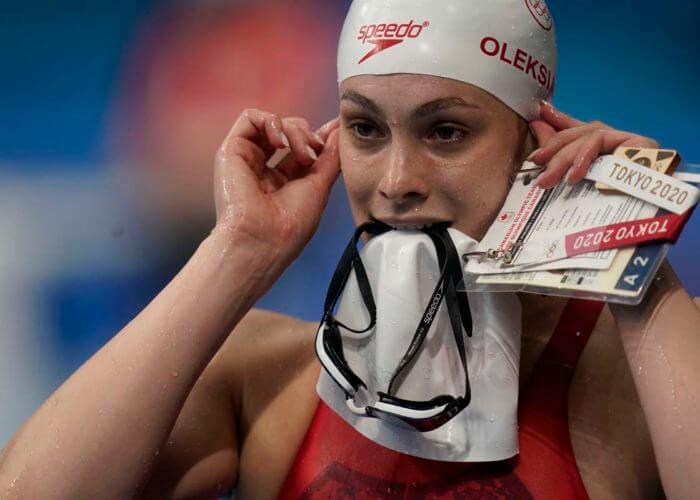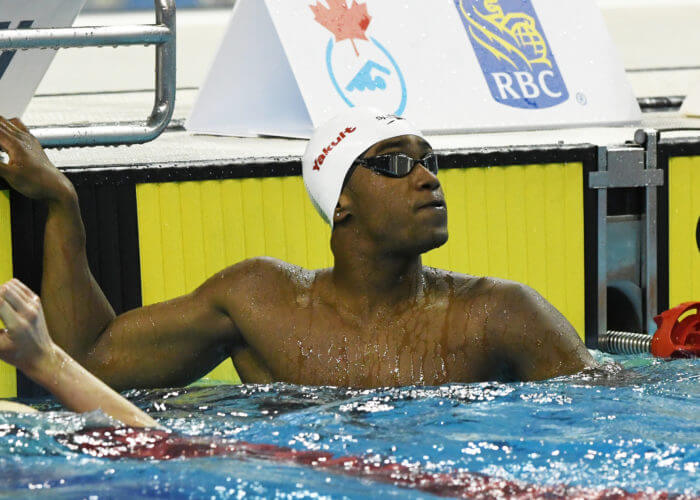Now On Road to Paris Games, Swimming Canada Riding Massive Wave of Momentum

Now On Road to Paris Games, Swimming Canada Riding Massive Wave of Momentum
John Atkinson’s message of uncertainty was, in its paradoxical way, consistent.
Swimming Canada’s High Performance Director was unsure what the Tokyo Olympics would bring. As one of the last major swimming nations to return to normal training schedules, the disruption caused by the COVID-19 pandemic was significant. A thrice-postponed Olympic Trials, held in late June with a diminished field at close to the last possible minute, didn’t offer much clarity. Atkinson’s comments before departing for Tokyo were rooted in trust of his athletes, but he stopped short of setting concrete targets, tempering expectations with the reality they faced.
If uncertainty was the correct term before the Olympics began, surprise wasn’t quite the right one by the end of the week at the Tokyo Aquatics Center.
In most every department, Canadian swimmers exceeded expectations at the Tokyo Games, adjusted down for COVID-19 or not. The Canadians left with six medals, all on the women’s side, including a gold for Maggie MacNeil in the 100 butterfly. They tallied four fourth-place finishes, all in Canadian-record times, which Atkinson views as tantamount to a medal. And the Canadian delegation showed that the future is as bright as the present, with prolific young talents on both sides of the competition.
“They just do what they need to do to regroup and refocus,” Atkinson said. “And the resilience they’ve shown over the last 17 months of the pandemic is extraordinary and something I would commend everybody for.”
The iconic shock and elation in MacNeil’s face at seeing the board after the 100 fly, having bested a field that included world record holder Sarah Sjostrom and eventual seven-time medalist Emma McKeon, perfectly encapsulates the Canadians’ Olympics. It was a performance that MacNeil knew she could do, from her dominance in college at the University of Michigan to her 2019 world championship. But after having to abruptly switch training bases during the pandemic, there were still understandable reservations until that final stroke that she would be able to deliver her best at the pivotal moment.

Photo Courtesy: Grace Hollars/USA Today Sports
Every swimmer experienced their moments of adversity before the Games. Penny Oleksiak was out of the water for two extended stretches due to persistent back pain. Kylie Masse had to move cross-province to train at the High Performance Centre in Toronto when other pools were unavailable. Sydney Pickrem’s move to HPC Toronto involved a hasty decamping from her base in College Station, Texas, before the border closed.
Yet with those toils endured, the medals flowed to the Canadian women. Masse – a leader in and out of the pool and, according to coach Ben Titley, “possibly the greatest human being I’ve ever coached” – briefly held the Olympic record in the 100 backstroke and set national records in both backstroke events on the way to a pair of silver medals. Oleksiak delivered a gutsy performance in the 200 free to rally in the final 50 for bronze and set a Canadian record in fourth place in the 100. That training group in Toronto proved to be the physical and emotional core of the team, hastening the camaraderie that most nations struggle to assemble in the few weeks before the Games.
In the relays, the Canadians tossed down a marker in the 400 freestyle by beating the Americans to silver, thanks in large part to Oleksiak’s outstanding anchor leg of 52.26 seconds. (In another continental measuring stick, MacNeil’s 55.59 in the 100 fly was the only Americas record set by a woman at the Games.) After finishing just off the podium in the 800 free relay in another Canadian record, Oleksiak added medal No. 7 of her career with bronze in the 400 medley relay to become Canada’s most decorated Olympian – man or woman, Summer or Winter – of all time.
“It just shows that she can step up when the pressure is at its greatest,” MacNeil said of her teammate. “That’s when it matters most, when it comes down to who’s the best on the day, and that usually is Penny.”
The Canadian men didn’t carry the same pedigree to Tokyo, but they delivered what is likely Canada’s swim of the meet (outside of MacNeil’s gold) in the 400 free relay. Little was expected from a foursome that needed a late-May time trial to solidify its Tokyo spot and entered with the ninth seed.

Photo Courtesy: Scott Grant
But the team of Brent Hayden, Joshua Liendo, Yuri Kisil and Markus Thormeyer ended up fourth, just sixth tenths off the podium. They were third at the final handoff, though Thormeyer was no match for Kyle Chalmers in the Australians’ march up from sixth place to the bronze medal. Regardless of the placement, the time of 3:10.82 chopped nearly 1.5 seconds off the national record that had stood since the super-suited Beijing Olympics, a squad Hayden also led off. The 37-year-old, who unretired in 2019, was the lightning rod for progress in a young core. He tied for ninth in the 50 free, earning a semifinal swim, and his leadoff swim of 47.99 in the relay would’ve finished 10th in the 100 free. Both times, when you account for tech suits, are comparable to what he was capable of his mid-20s.
“This means that I made the right decision to come back,” Hayden said. “After being out of the sport for seven years, less than two years of training and I throw down a sub-48 100 meter freestyle – I’m not swimming it individually so I’m counting that as my time at the Olympics. I don’t regret my decision in London; I think at the time it was right. But I’m really thankful that I had the support from the people around me to come back to the sport and fall in love with it all over again.”
Canada’s relative youth makes its progress so encouraging. Its principal embodiment rests at the other end of the age spectrum from Hayden: Summer McIntosh, who finished fourth in the 400 free in a Canadian record of 4:02.42 at age 14. She led off the 800 free relay among a four-swim program where she rarely looked years younger than her fellow competitors, finishing ninth in the 200 free and 11th in the 800.
It’s easy to forget, given her heaving trophy case, that Oleksiak is only 21 years old. MacNeil is a first-time Olympian. Kayla Sanchez, in her first Games at 20, looked an unflappable relay cog on the way to two medals. Though she struggled individually, 21-year-old Taylor Ruck rebounded for solid relay swims as the Games wore on. With two Olympics under their belts, neither Masse (25) nor Pickrem (24) is at the end of the road. The most impressive swimmer on the men’s side was the 19-year-old Liendo, finishing 11th in the 100 fly and 14th in the 100 free.
It’s a lot to be proud of in Tokyo, but it’s also a lot to build on in the abbreviated preparations for Paris in 2024.
“I feel like we’re unstoppable,” Pickrem said. “I think we grew so much as a federation in general and we’ve carried momentum in ways that I didn’t think was even possible. I think that’s really cool that there’s just so much more to give. …
“Sometimes Ky (Masse) and I feel old, and we’re not old. And that’s how crazy it is, how young our team is and the fact that we just have so much to give going into the next cycles and the Olympics to come.”
Those expectations are ones Atkinson might not mind touting this far from Paris.



